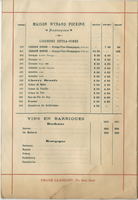Search the Special Collections and Archives Portal
Search Results
Las Vegas Ambassadors Collection
Identifier
Abstract
The Las Vegas Ambassadors Collection (1968-1985) primarily consists of a scrapbook, newspaper articles, and photographs documenting the activities of the Las Vegas Ambassadors youth singing group. The materials were compiled by Harry LaFavor, the Ambassadors' business manager, who co-founded the group with Norman Kaye and Richie Astone to promote a positive image of Las Vegas. The collection also includes a songbook, vinyl record and ¼” tape recording, and promotional materials.
Archival Collection
William Flangas Scrapbooks
Identifier
Abstract
The William Flangas Srapbooks document his anti-smoking efforts in Nevada from 1974 to 2014. These materials include correspondence, articles, copies of assembly bills, newsletters related to smoking and health, and newsletters related to non-smokers.
Archival Collection
Archie and Zora Grant Papers
Identifier
Abstract
The Archie and Zora Grant Papers document the lives of Archie and Zora Grant from 1918 to 1973. Materials include scrapbooks, clippings, correspondence, records, certificates, and awards pertaining to Archie’s career in the Nevada Legislature, the State Board of Education, Las Vegas Housing Authority, and Las Vegas Chamber of Commerce.
Archival Collection
Jay Sarno Photograph Collection
Identifier
Abstract
The Jay Sarno Photograph Collection (1947-1983) contains photographs from hotel and casino developer Jay Sarno. The photographs primarily depict Sarno and his family. The photographs also depict some of Sarno's development projects, including Circus Circus, Caesars Palace, and the Grandissimo. The photographs depict construction of the hotels, events, and famous figures.
Archival Collection
Clyde F. Merrick Photographic Slides
Identifier
Abstract
The Clyde F. Merrick Photographic Slides (approximately 1971-1979) contain color photographic slides taken by Clyde F. Merrick, longtime resident of Las Vegas, Nevada. The majority of slides in this collection depict signs for different businesses around Las Vegas including the Las Vegas Strip and the Westside. Some of the businesses documented in this collection includes Fong's Garden, Leon's Shear Magic Beauty Salon, Lucas and Son's Antiques, Dick's Tricky Trikes, Mohan's Custom Tailors, the Twenty Grand Club, Owens TV Repair, and Caesars Palace. The collection also documents a variety of different types of businesses around Las Vegas including bars and nightclubs, beauty salons, car washes, gas stations, and restaurants. Merrick was also a car racing hobbyist and a number of slides in this collection depict what is presumed to be the Las Vegas Speedrome racetrack (later known the Las Vegas Motor Speedway). This collection also includes photographs of locations outside of Las Vegas and Southern Nevada.
Archival Collection
Charley Henchis Papers
Identifier
Abstract
The Charley Henchis Papers (approximately 1945-1987) document the career of international cabaret show producer Charley Henchis and the shows he produced in Las Vegas, Nevada and Beirut, Lebanon. Materials include Henchis' business files which includes correspondence, files on specialty acts, photographs, and press about Henchis. Shows represented in this collection includes
Archival Collection
Felicia Campbell Papers
Identifier
Abstract
The Felicia Campbell Papers (approximately 1962-2020) contains material documenting the life and work of long-time UNLV English professor, Felicia Campbell. Materials include Campbell's personal and professional papers including correspondence, scholarly journals featuring her published articles, article drafts, newspaper clippings, photographs, personal diaries, and awards. Also included are materials documenting Campbell's discrimination lawsuit against UNLV in the 1970s regarding equal pay for tenured female faculty.
Archival Collection
Felix Lenox Photograph Collection
Identifier
Abstract
The Felix Lenox Photograph Collection (approximately 1910-2000) contains original photographic slides, prints, and contact sheets collected by Lenox in support of his popular "Nevada Armored Transport Inc. (1946-1984)" Facebook page. The collection also includes Lenox's own research on Las Vegas history and armored trucks.
Archival Collection

